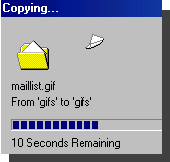How often do you back up the data on your computer? If you're like most people, not very often, if at all. Yet the information stored on the hard drive can be incredibly valuable. Think of your financial records, business contacts, e-mail addresses, letters and so on. What would happen if it all just disappeared?  How long would it take and how much would it cost to reconstruct the missing data? Can't happen? It does every day for a variety of reasons:
How long would it take and how much would it cost to reconstruct the missing data? Can't happen? It does every day for a variety of reasons:
-
The disk drive you use for backups fails for mechanical reasons.
-
Your computer is stolen--laptops are particularly vulnerable.
-
Your computer is destroyed by fire, floods or other disasters.
-
A power surge fries your machine (Make sure you have a surge protector on your computer equipment.)
-
An employee or family memeber accidentally or intentionally erases key data.
-
A virus infects your system.
-
Your hard drive crashes. Sooner or later it will; the only question is when.
Computer files can be restored in the event of a crash, but it will cost you several hundred or even thousands of dollars. In the meantime, you may be lost without essential data.
If you diligently back up your system and store the backups off-site, you're in good shape. But most of us never do this--until it's too late.
What to Back Up
The good news is that you don't need to make copies of all the files on your hard drive. These days, that could entail many gigabytes of data. You only have to back up your own data files, such as word processing documents, spreadsheets, e-mail, digital photos, graphics, etc. Basically, any files you've created or that were sent to you. You probably already have copies on CD-ROMs of your program files--Microsoft Office applications, web browsers, plug-ins and such. In the event that your computer crashes, you can use those to restore the programs or you can download replacement programs from the Net.
How to Back Up Files
Files should be stored on removable media like floppy disks, zip disks, CD- ROMs, data tapes or an external hard drive. Since floppies only hold 1.4 Mb of data, they aren't very practical, unless you have only a few files. On the other hand, CD-ROMs hold 650 Mb, so if you have a CD-RW drive, you're in luck. Recordable CDs are inexpensive and also provide an excellent way to share data with friends and colleagues.
ROMs, data tapes or an external hard drive. Since floppies only hold 1.4 Mb of data, they aren't very practical, unless you have only a few files. On the other hand, CD-ROMs hold 650 Mb, so if you have a CD-RW drive, you're in luck. Recordable CDs are inexpensive and also provide an excellent way to share data with friends and colleagues.



